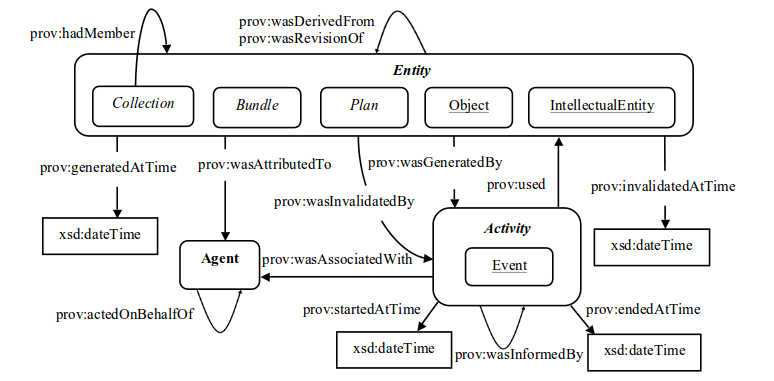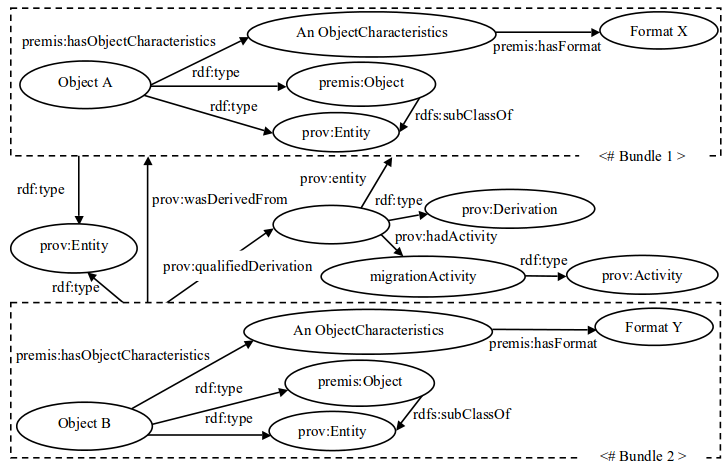The basic premise of "Provenance Description of Metadata using PROV with PREMIS for Long-term Use of Metadata" is:
- PROV-O and PREMIS should be used in conjunction with each other
- Differences
- Activity and Event
- "PREMIS uses preservation-specific value vocabularies defined by Library of Congress."
- Responsible Agent
- "In PREMIS, Agent influences Object through Event. That is, Agent is not directly connected to Object as shown in Figure 4. However, PROV allows Agent, Entity and Activity to be related with each other directly."
- Relationships between Entities and Relationships between Objects
- "PROV defines relationships between Activities and relationships between Agents, whereas PREMIS does not include those relationships.
- "PROV is designed for generalized provenance description and interchange among different systems, whereas PREMIS is primarily for preservation metadata description used for digital preservation. The specialized PREMIS terms used to describe preservation could enrich expressive power of PROV."
- Activity and Event
- Maps basic classes between them
- premis:IntellectualEntity and premis:Object are mapped as a subclasses of prov:Entity
- premis:Event is mapped as a subclasses of prov:Activity
- premis:Agent and prov:Agent are "almost" the same, and the relationship can be described using owl:equivalentClass
- Proposed model
- Example description using proposed model
PROV-O and PREMIS Class Reference
Current use of PROV-O
PROJECT | DESCRIPTION | PEOPLE | INSTITUTION |
Kino is an integrated suite of tools that enables scientists to... | Amit Sheth, Ajith Ranabahu, Maryam Panahiazar | Ohio Center of Excellence in Knowledge-enabled Computing (Kno.e.sis) | |
Open PHACTS (Open Pharmacological Concepts Triple Store) is a k... |
Source: http://bioportal.bioontology.org/ontologies/PROVO
PROV-O events vs PREMIS events
The notion of “event” is “not first-class in the PROV-O data model”. However, the principal event-related concept defined in PROV-O, prov:InstantaneousEvent, defined as “an instantaneous event, or event for short, happens in the world and marks a change in the world, in its activities and in its entities”, does seem to be conceptually appropriate for describing Fedora audit events.
In comparison, PREMIS events-related classes are “first class citizens” with adequate granularity for describing Fedora audit events.
PROV-O and PREMIS event-related classes:
PROV-O Events | PREMIS Events | ||||
Class | Sub-classes | Data/Object properties | Class | Sub-classes | Data/Object properties |
|
| premis:hasEventRelatedAgent | |||
Strawman Examples
flat
<premisobject> a prov:InstantaneousEvent <premis:hasEventType> http://id.loc.gov/vocabulary/preservationEvents/fixityCheck <premis:hasEventRelatedAgent> "fedoraUser"^^xsd:string <prov:atTime> "2012-04-30T20:40:40"^^xsd:dateTime <premis:EventOutcomeInformation> "cf23df2207d99a74fbe169e3eba035e633b65d94"^^xsd:string <premis:EventOutcomeDetail> "SHA1"^^xsd:string
nested
<apremiseventobject> a prov:InstantaneousEvent <premis:hasEventType> http://id.loc.gov/vocabulary/preservationEvents/fixityCheck <premis:hasEventRelatedAgent> <premis:agent> <prov:atTime> "2012-04-30T20:40:40"^^xsd:dateTime <premis:hasFixity> <premis:Fixity> <apremisagent> a premis:Agent <foaf:name> "Joe User"^^xsd:String <apremisfixity> a premis:Fixity <premis:hasMessageDigest> "cf23df2207d99a74fbe169e3eba035e633b65d94"^^xsd:string <premis:hasMessageDigestAlgorithm ""SHA1"^^xsd:string

